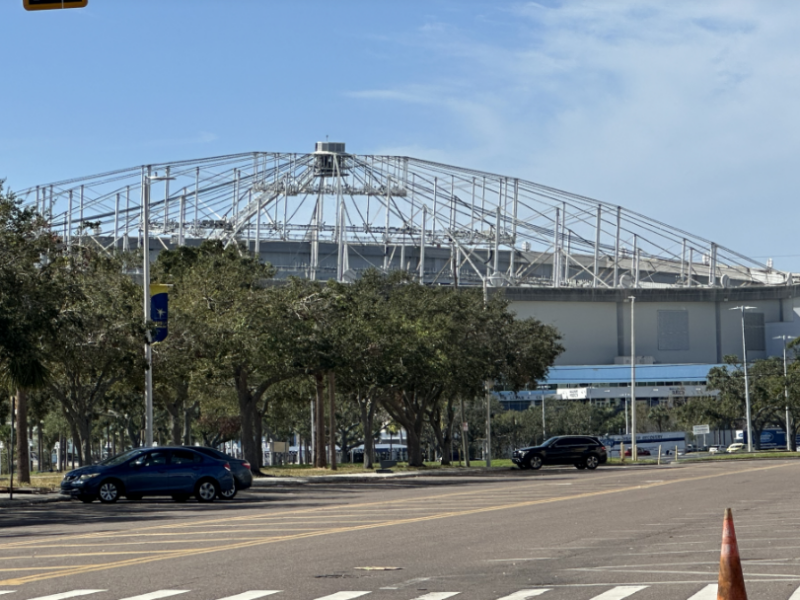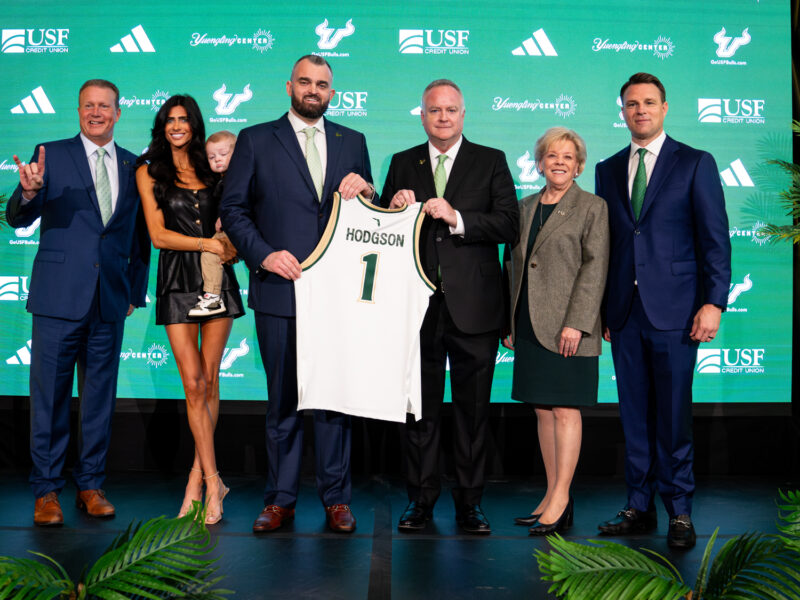The University of South Florida has some speech codes that “prohibit expression that would be protected by the First Amendment in society at large,” according to the Foundation for Individual Rights in Education.
The Crow’s Nest reported on these codes in November, after USF St. Petersburg’s codes were scrutinized by the FIRE.
But this semester, two of the codes that the FIRE viewed as the greatest offenders have been edited.
Azhar Majeed, director of the FIRE’s individual rights education program, was pleasantly surprised.
“Typically we see universities revising these kind of policies over the summer,” Majeed told The Crow’s Nest. “Obviously, we’re very happy to see this.”
Jodi Adamchak, a USF official who works for the office of general council and deals with the policies, did not return The Crow’s Nest’s calls or emails.
The FIRE is an organization based in Philadelphia, Pa. that seeks to defend university students’ individual rights, including due process and freedom of speech. Its staff includes high-profile figures such as attorneys, many whose work has been published in news outlets, including The Wall Street Journal, The New York Times and the Washington Post.
Thefire.org analyzes and rates speech codes at universities across the country. A university that receives a red-light rating has at least one code that the FIRE claims significantly restricts free speech on campus. It is common for universities to receive a red-light rating. The only Florida university with a green-light rating is the University of Florida.
In November, the USF system had three red-light policies, leading to a red-light rating at USF Tampa and USF St. Petersburg. Now, two of those codes have been edited. These two codes, now considered yellow-light policies, are university system policies regarding sexual harassment, and diversity and equal opportunity. The FIRE says yellow-light policies still restrict free speech, but to a lesser extent than red-light policies.
One red-light policy remains, making both USF St. Petersburg and Tampa red-light campuses. But Majeed is pleased with the changes.
“We would like to follow up with both campuses on this and try to get that final code revised,” he said.
Regarding sexual misconduct, the old version of the code included a list of examples that extended to speech.
“That can include a lot of protected speech on issues such as same-sex marriage, reproductive rights,” Majeed said.
While the new code still lists examples, Majeed thinks it is improved because it lists examples that are physical actions and don’t relate to speech.
The policy involving discrimination also removed some of the examples.
The two policies still receive yellow-light ratings because of vague wording that could be interpreted to include speech, Majeed said. With the current codes, the university could still punish a student who said something that may offend another.
“That’s certainly not the way to respond to speech you disagree with,” Majeed said. “But, I have to emphasize that this policy is in much better shape than it was before.”
The First Amendment to the Constitution
Congress shall make no law respecting an establishment of religion, or prohibiting the free exercise thereof; or abridging the freedom of speech, or of the press; or the right of the people peaceably to assemble, and to petition the government for a redress of grievances.
To view the rest of USF St. Petersburg’s codes that have been rated by the FIRE, visit http://www.thefire.org/schools/university-of-south-florida-at-saint-petersburg/.
Compare and Contrast
These two system policies have been edited, resulting the FIRE changing the rating from red-light to yellow-light. Here’s how the ratings have changed:
USF System Policy Sexual Misconduct/Sexual Harassment (Including Battery) 14-15
Before:
“A. The following actions are prohibited:
- Sexual harassment by or between any faculty member, staff, or student, including individuals of the same sex.”
“B. Examples of prohibited conduct include, but are not limited to:
- Displaying or telling sexually oriented jokes, statements, photographs, drawings, computer images, web sites, videos, slides, graphics, calendars, cartoons, e-mails or other communications.”
“A. Sexual Harassment (which includes sexual violence) is any of the conduct below:
Unwelcome sexual advances, requests for sexual favors and other verbal or physical conduct of a sexual nature when: … Such conduct is sufficiently severe or pervasive so as to alter the conditions of, or have the purpose or effect of substantially interfering with, an individual’s work or academic performance by creating an intimidating, hostile, or offensive working or educational environment. This may include off-campus acts of sexual harassment that have effects on campus which may contribute to a sexually hostile environment.”
Now:
The following actions are prohibited: 1. Sexual harassment, including sexual violence, by or between any faculty member, staff, or student, including individuals of the same sex, in all academic, educational, extracurricular, athletic, and other programs of the University, whether those programs take place in University facilities, at a class or training program sponsored by the University at another location, or elsewhere.
Examples of prohibited conduct include, but are not limited to:
- Requesting or coercing sexual intercourse or sexual favors, or attempting to or actually engaging in a sexual assault or sexual battery.
- Inappropriate and unwelcome sexual attention or touching, including–but not limited to–leering, patting, fondling, pinching, and attempted or actual kissing.
- Making actual or implied threats to impede or interfere with employment or educational opportunities or benefits for failing to agree to or engage in sexual activity.
- Making actual or implied promises of an employment or educational opportunity or benefit in exchange for sexual activity.
- Inferring or displaying favoritism that benefits or adversely affects another based on sexual involvement or a sexual relationship.
- Making sexually explicit or suggestive gestures or sounds.
Sexual Harassment (which includes sexual violence) is any of the conduct below:
Unwelcome sexual advances, requests for sexual favors and other verbal, nonverbal or physical conduct of a sexual nature when: a. Submission to such conduct is made, either explicitly or implicitly, a term or condition of an individual’s employment or educational experience; b. Submission to or rejection of such conduct by an individual is used as the basis for employment or educational decisions affecting that individual; or c. Such conduct is sufficiently severe or pervasive so as to alter the conditions of, or have the purpose or effect of substantially interfering with, an individual’s work or academic performance by creating an intimidating, hostile, or offensive working or educational environment. This may include off-campus acts of sexual harassment, including sexual violence, that have effects on campus which may contribute to a sexually hostile environment.
USF System Policy: Diversity and Equal Opportunity-Discrimination and Harassment 14-15
Before:
“B. Examples of Prohibited Conduct Include, but Are Not Limited To:
- Writing or displaying letters, notes, or e-mails which are derogatory toward any individual’s race, color, marital status, sex, religion, national origin, disability, age, genetic information, sexual orientation, gender identity and expression, or veteran status.
- Making comments, slurs, or jokes which are derogatory toward any individual’s race, color, marital status, sex, religion, national origin, disability, age, genetic information, sexual orientation, gender identity and expression, or veteran status.
- Making gestures or displaying pictures, cartoons, posters, or magazines which are derogatory toward any individual’s race, color, marital status, sex, religion, national origin, disability, age, genetic information, sexual orientation, gender identity and expression, or veteran status.”
Now:
- The Following Actions Are Prohibited: 1. Discrimination and/or harassment by any USF System employee or student against any individual(s) or group(s) within the USF System.


